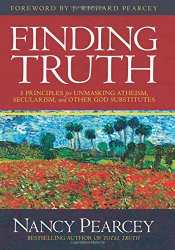Finding Truth is the latest book from Nancy Pearcey, author of a number of books on worldviews such as Total Truth and Saving Leonardo. Pearcey has a knack for explaining theological and philosophical ideas in terms that are understandable for those without degrees in those subject areas. In Finding Truth, she presents five principles that will help Christians unmask the errors of other worldviews: 1.) “identify the idol,” 2.) “identify the reductionism,” 3.) “test the worldview against the facts of experience,” 4.) “show that every reductionistic worldview is self-defeating,” and 5.) “make the case for a Christian worldview” (pp. 256-257). She derives these principles from the book of Romans, referring to Romans 1 as “Paul’s apologetics training manual” (p. 24).
Pearcey walks us through each principle with specific examples from different worldviews, demonstrating where they lack coherence. I suspect that many of those who read Finding Truth will be surprised as they recognize widely held beliefs then follow Pearcey’s skillful dismantling of their intellectual underpinnings.
Pearcey does this using language and images that are easy to grasp. For example, when she talks about reductionism, Pearcey shows how non-Christian worldviews have to reduce their view of man or reality to fit their philosophy, yet something always ends up “sticking out of the box” because their worldview cannot account for everything. When she discusses the fifth principle she uses the term “free-loading atheists” to describe those who reject Christianity, yet borrow ideas that are premised upon a Christian worldview to justify their actions or beliefs. We all get the ideas of free loaders! Pearcey uses clear examples to demonstrate what she’s saying. In relation to the free-loading atheists and morality, she reminds us that atheists will, like those with a Christian worldview, insist that if someone cheats or steals from them that this is morally wrong. Yet, they have to “free load” on the Christian worldview to come up with a sustainable defense of moral right and wrong.
I found the section on the self-defeating nature of most worldviews one of the most interesting. An example from her treatment of the beliefs of evolutionists demonstrates her approach. On page 193, referring to the conundrum evolutionists confront regarding truth itself, she says,
Of course, the sheer pressure to survive is likely to produce some correct ideas. A zebra that thinks lions are friendly will not live long. But false ideas may be useful for survival. Evolutionists admit as much: Eric Baum says, "Sometimes you are more likely to survive and propagate if you believe a falsehood than if you believe the truth.” Steven Pinker writes, “Our brains were shaped for fitness, not for truth. Sometimes the truth is adaptive, but sometimes it is not.” The upshot is that survival is no guarantee of truth. If survival is the only standard, we can never know which ideas are true and which are adaptive but false.
Pearcey frequently quotes directly from those holding other worldviews to accurately reflect their beliefs. The book is heavily footnoted in case you want to investigate sources yourself. (You might find some of the quotes so astonishing that you will want to check them out yourself—especially those where atheists and others admit the fallacies of their own worldviews.)
A forty-page study guide at the back of the book poses questions for each section and presents a sample test. The questions are challenging, requiring a significant amount of reflection and writing. For example, one of the shorter questions asks: “Explain the concept of common grace. What are the implications for apologetics?” (p. 333). The questions can easily be used to create a complete college course based on the book, so you might use them more selectively in other situations or skip them altogether.
The book is relatively easy to read although the study guide seems targeted at a college-level audience. In the book itself, Pearcey often repeats the key ideas within different contexts, so it is easy to follow her line of thinking. What we gain from it are principles that are broadly applicable rather than specific arguments against every worldview. If we can learn to ask the right questions—the ones that get to the very heart of whatever worldview someone holds—we can challenge worldviews on the level of, “Does that even make sense?” Of course, as Pearcey shows in her book, many people hold to their worldviews for emotional rather than logical reasons, and that can make people resistant to even discussing the important questions that shape their worldviews. Nevertheless, arming yourself with these principles will make it much easier to discuss worldviews and philosophies, and to defend a Christian worldview as the only option that truly reflects reality.










